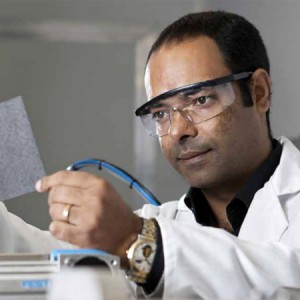Where do you work?
HySA Systems, based at the South African Institute for Advanced Materials Chemistry (SAIAMC) at the University of the Western Cape, where he is Programme Manager of the Combined Heat and Power Programme.
What is a typical day?
The Combined Heat and Power (CHP) programme aims to develop customised fuel cells for use as a CHP source supplying decentralised power and heating for buildings and industries. CHP systems are popular in colder countries where heating is required more often. Thus the CHP programme is aimed at meeting the needs of the global market.
Pasupathi coordinates all the projects within the CHP programme, ensuring work is completed on time and reporting back to the funders. His overall goal is to ensure the CHP project is a success and to bring locally developed products to the international market. He also undertakes his own research, supervises students and lectures honours students.
A typical day will involve meetings with project groups, collaborators or researchers and overseeing some of the Research and Development work. He also fits in the writing of project proposals or reports and checks some of his colleagues’ research manuscripts in order to ensure some of the research coming out of the programme is published.
Why is your job important?
This work gives me the opportunity to bring something new and advanced to the community and the South African economy through research and development.
Why did you choose this path?
I loved Chemistry throughout school, especially the practicals involving titrations and preparing organic compounds which require close and precise attention to detail. After completing my master’s degree, I carried out a project on fuel cells which I enjoyed so much I decided to pursue a career in this area.
Where can hydrogen fuel cell experts work?
Internationally, there are several companies and research institutions recruiting HFC experts and they are found easily by searching for this discipline on the internet. Locally, HFC experts can find work at the three national Centres of Competence (see above) and various tertiary institutions and science councils working in this area.
What do you need to get there?
School subjects: Science (mainly Chemistry and Physics) and Mathematics.
Qualifications: At university, take a degree in Chemistry, Physics or Chemical, Mechanical or Electrical Engineering. A postgraduate qualification is highly recommended.

To succeed you need motivation, perseverance, dedication and attention to the smallest details. The job opportunities in this sector are increasing significantly globally, with several new companies being established.
